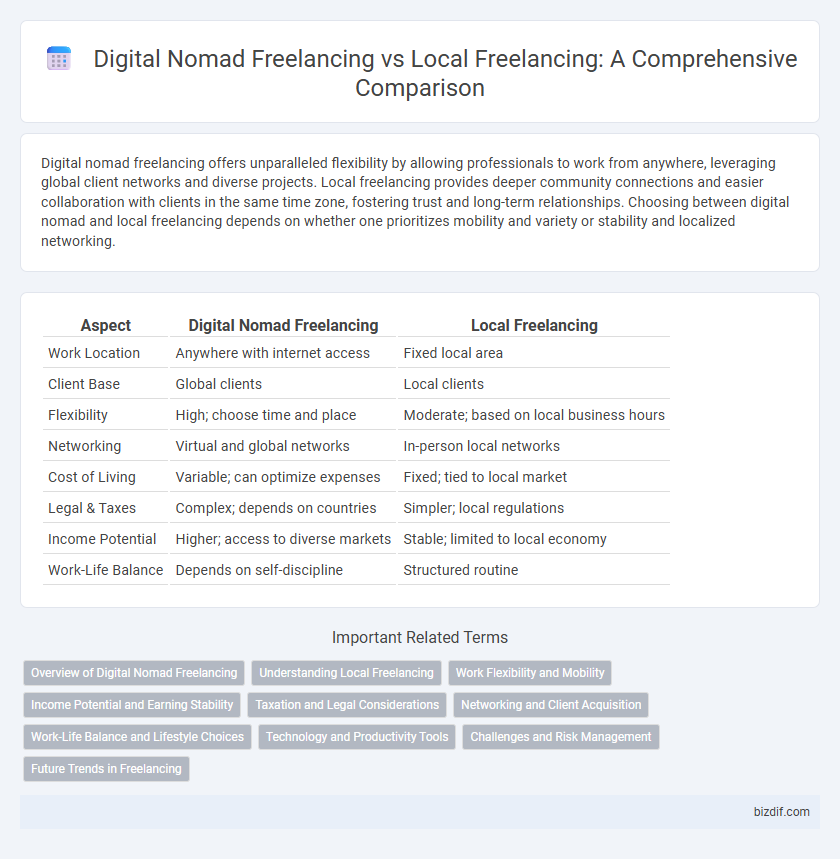Digital nomad freelancing offers unparalleled flexibility by allowing professionals to work from anywhere, leveraging global client networks and diverse projects. Local freelancing provides deeper community connections and easier collaboration with clients in the same time zone, fostering trust and long-term relationships. Choosing between digital nomad and local freelancing depends on whether one prioritizes mobility and variety or stability and localized networking.
Table of Comparison
| Aspect | Digital Nomad Freelancing | Local Freelancing |
|---|---|---|
| Work Location | Anywhere with internet access | Fixed local area |
| Client Base | Global clients | Local clients |
| Flexibility | High; choose time and place | Moderate; based on local business hours |
| Networking | Virtual and global networks | In-person local networks |
| Cost of Living | Variable; can optimize expenses | Fixed; tied to local market |
| Legal & Taxes | Complex; depends on countries | Simpler; local regulations |
| Income Potential | Higher; access to diverse markets | Stable; limited to local economy |
| Work-Life Balance | Depends on self-discipline | Structured routine |
Overview of Digital Nomad Freelancing
Digital nomad freelancing involves working remotely while traveling or living in various locations, leveraging digital technology to stay connected with clients globally. This lifestyle offers flexibility and exposure to diverse cultures, often leading to a broader network and increased opportunities for international projects. Unlike local freelancing, digital nomads prioritize mobility, relying heavily on reliable internet access and digital collaboration tools to manage their work efficiently.
Understanding Local Freelancing
Understanding local freelancing involves recognizing the significance of geographic proximity in client relationships, face-to-face meetings, and community engagement. Local freelancers often benefit from quicker payment cycles, regional market knowledge, and networking opportunities that foster trust and repeat business. Emphasizing specialization in local industries increases competitive advantage and enhances service relevance.
Work Flexibility and Mobility
Digital Nomad freelancing offers unparalleled work flexibility and mobility, enabling professionals to operate from any location with reliable internet access, which enhances creative freedom and exposure to diverse markets. In contrast, local freelancing often requires adherence to regional schedules and client proximity, limiting the ability to travel while maintaining consistent work. Embracing digital nomadism expands opportunities for global networking and dynamic lifestyle choices, crucial factors for freelancers prioritizing adaptability and geographic independence.
Income Potential and Earning Stability
Digital nomad freelancing often offers higher income potential due to access to global clients willing to pay premium rates, leveraging currency differences and diverse market demands. Local freelancing provides more earning stability with consistent, repeat clients and reduced competition, benefiting from established networks and localized market knowledge. Balancing flexibility and risk, choosing between digital nomad and local freelancing depends on prioritizing either income growth or income reliability.
Taxation and Legal Considerations
Digital nomad freelancing often involves complex taxation due to income earned across multiple jurisdictions, requiring adherence to international tax treaties and potential obligations like foreign tax credits or double taxation agreements. Local freelancing generally mandates compliance with domestic tax laws, including income tax registration, VAT or sales tax filing, and social security contributions based on the freelancer's country of residence. Understanding the legal framework governing business licenses, permits, and contractual obligations is crucial for both models to ensure regulatory compliance and avoid penalties.
Networking and Client Acquisition
Digital nomad freelancing offers access to a global network of clients and professionals, enhancing opportunities for diverse projects and skill expansion. Local freelancing provides deeper community ties and easier in-person networking, which can foster stronger client relationships and repeat business. Effective client acquisition in digital nomad freelancing relies heavily on online platforms and virtual communication, while local freelancing benefits from face-to-face meetings and local referrals.
Work-Life Balance and Lifestyle Choices
Digital nomad freelancing offers unparalleled lifestyle flexibility, allowing professionals to work from exotic locations while integrating travel with work, enhancing personal growth and cultural experiences. Local freelancing provides stability with consistent access to community networks, home comforts, and predictable work environments, supporting deeper local relationships and routines. Both models demand disciplined time management to maintain work-life balance, but digital nomads often face challenges in separating work from leisure due to the blurred boundaries of their mobile lifestyle.
Technology and Productivity Tools
Digital nomad freelancing relies heavily on cloud-based technology and productivity tools like VPNs, project management apps, and communication platforms to maintain seamless workflows across different time zones. Local freelancing benefits from in-person collaboration tools and stable office networks, often leveraging hardware-dependent software for specialized tasks. Both approaches require adaptable technology stacks, but digital nomads prioritize mobility and connectivity to optimize productivity on the go.
Challenges and Risk Management
Digital nomad freelancing faces challenges including unstable internet connectivity, time zone differences, and legal complexities related to visas and taxes, requiring robust risk management through reliable communication tools and thorough fiscal planning. Local freelancing offers more predictable work environments and simpler regulatory compliance but risks stagnation due to limited market reach and client diversity. Effective risk management in both models involves diversifying income streams, maintaining strong client relationships, and staying updated on legal obligations to mitigate financial and operational uncertainties.
Future Trends in Freelancing
Digital nomad freelancing is rapidly growing due to advancements in remote work technologies, enabling professionals to work from any location globally, while local freelancing remains essential for clients seeking in-person collaboration. Emerging trends show a surge in platform-based freelance marketplaces that support cross-border projects and digital nomad lifestyles, driving increased competition and innovation. AI-driven project management tools and blockchain-based payment systems are set to revolutionize both digital nomad and local freelancing by enhancing efficiency and security in client-freelancer transactions.
Digital Nomad Freelancing vs Local Freelancing Infographic

 bizdif.com
bizdif.com